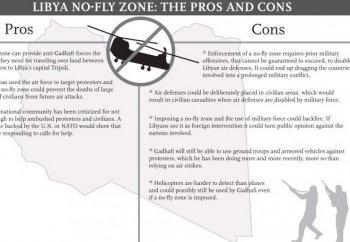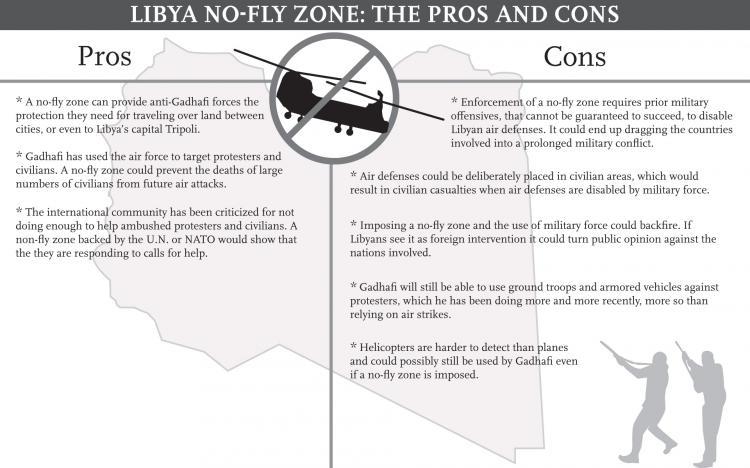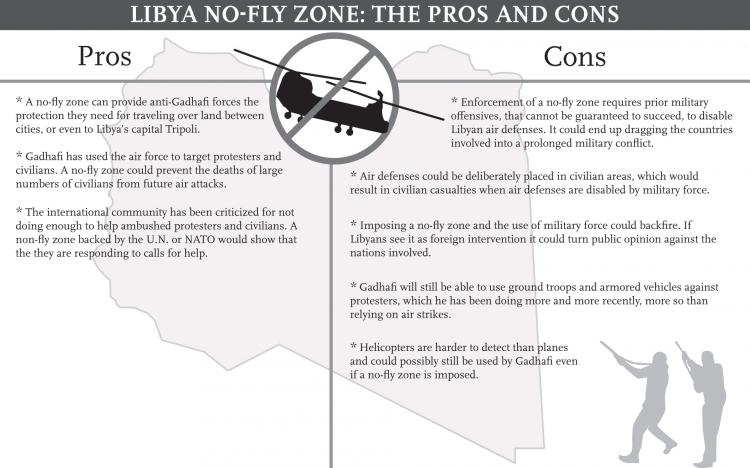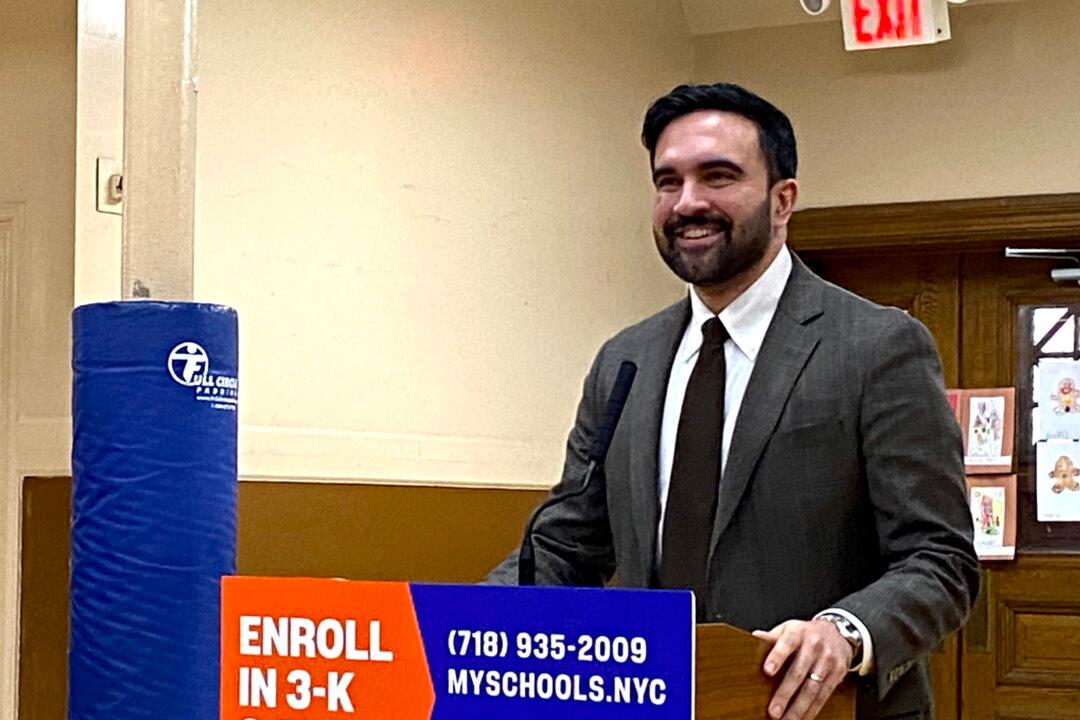Rebels are calling on the international community to protect civilians with a no-fly zone over Libya, ensuring Moammar Gadhafi’s forces cannot use air strikes against them. While the Obama administration is wavering over steps to establish a no-fly zone, its NATO partners and co-United Nations Security Council members—mainly the U.K. and France—have drafted a resolution proposing terms.
The main question for the West is whether the no-fly zone is the first step to yet another war in the region.
Ambassador (Ret.) Robert Hunter, a senior adviser with the RAND Corporation and former U.S. ambassador to NATO says in theory the operation could be as simple as declaring a no-fly zone, and then “use aircraft with standoff weapons and shoot airplanes down.”
“It may be that just declaring and starting to do that will lead Libyan pilots to say they don’t want to fly anymore,” he speculated.
Hunter says Libya’s facilities that fire long-range, surface-to-air missiles may not even need to be destroyed. He says that with these facilities “you might not go after all of them, but you might say, ‘if any of them turn their radars on we will destroy them.’”
But even if the operation is short and tidy, Hunter makes no bones about the fact that it still constitutes “military intervention” in Libya.
Policy director of Global Security.org, John Pike, thinks military action to knock out Libya’s air defenses and maintain the no-fly zone would be straightforward.
“If we are just talking about hot steel on-target, if you are simply talking at the tactical level, how many bombs have to be dropped, or at the operational level, how many fighter planes have to be available, I think it is pretty straightforward and not that hard to do.”
Although it’s conceivable that a no-fly zone might not involve an outright act of war, Pike points out that once the military is there bombing missile launch facilities and shooting down planes, the possibility for civilian deaths exists.
“If over time, if you’re going to enforce this, then there’s always the possibility of civilian casualties.”
According to Pike, in this scenario, the no-fly action could become a war.
“If there was minimal possibility of civilian casualties it would not be war, it would be law enforcement. We know that it is war because we know that the innocent will die.”
Defense Secretary Gates also thinks that a no-fly zone could effectively become war in Libya.
Testifying in the House last week, Gates warned that a no-fly zone would require “a big operation in a big country.”
“A no-fly zone begins with an attack on Libya to destroy the air defenses. That’s the way you do a no-fly zone. And then you can fly planes around the country and not worry about our guys being shot down. But that’s the way it starts,” said Gates.
On Tuesday, Secretary State Hillary Clinton said the United States won’t spearhead the no-fly move on its own, but would go along with an international effort.
“I think it’s very important that this not be a U.S.-led effort, because this comes from the people of Libya themselves. This doesn’t come from the outside,” said Clinton.
Also Tuesday, the Organization of the Islamic Conference (OIC), a body of 57 states promoting Muslim interests, met and decided the OIC is “against any form of military intervention to Libya.”
Even so, the conference “will further review the latest developments in Libya” and consider supporting an international effort to establish a no-fly zone over Libya to protect civilians.
Maintaining a no-fly zone in Libyan airspace could become a prolonged campaign. Recently Gadhafi said Libya will fight back against such a measure.
Speaking Wednesday on Turkey’s state-run TRT news, Gadhafi played up the propaganda value of the proposed no-fly zone. He said it would be “useful for Libya, because the Libyan people will see the truth, that what they [the West] want is to take control of Libya and to steal [the people’s] oil.”
“The Libyan people will take up arms against them,” Gadhafi threatened.
The main question for the West is whether the no-fly zone is the first step to yet another war in the region.
Ambassador (Ret.) Robert Hunter, a senior adviser with the RAND Corporation and former U.S. ambassador to NATO says in theory the operation could be as simple as declaring a no-fly zone, and then “use aircraft with standoff weapons and shoot airplanes down.”
“It may be that just declaring and starting to do that will lead Libyan pilots to say they don’t want to fly anymore,” he speculated.
Hunter says Libya’s facilities that fire long-range, surface-to-air missiles may not even need to be destroyed. He says that with these facilities “you might not go after all of them, but you might say, ‘if any of them turn their radars on we will destroy them.’”
But even if the operation is short and tidy, Hunter makes no bones about the fact that it still constitutes “military intervention” in Libya.
Policy director of Global Security.org, John Pike, thinks military action to knock out Libya’s air defenses and maintain the no-fly zone would be straightforward.
“If we are just talking about hot steel on-target, if you are simply talking at the tactical level, how many bombs have to be dropped, or at the operational level, how many fighter planes have to be available, I think it is pretty straightforward and not that hard to do.”
Although it’s conceivable that a no-fly zone might not involve an outright act of war, Pike points out that once the military is there bombing missile launch facilities and shooting down planes, the possibility for civilian deaths exists.
“If over time, if you’re going to enforce this, then there’s always the possibility of civilian casualties.”
According to Pike, in this scenario, the no-fly action could become a war.
“If there was minimal possibility of civilian casualties it would not be war, it would be law enforcement. We know that it is war because we know that the innocent will die.”
Defense Secretary Gates also thinks that a no-fly zone could effectively become war in Libya.
Testifying in the House last week, Gates warned that a no-fly zone would require “a big operation in a big country.”
“A no-fly zone begins with an attack on Libya to destroy the air defenses. That’s the way you do a no-fly zone. And then you can fly planes around the country and not worry about our guys being shot down. But that’s the way it starts,” said Gates.
On Tuesday, Secretary State Hillary Clinton said the United States won’t spearhead the no-fly move on its own, but would go along with an international effort.
“I think it’s very important that this not be a U.S.-led effort, because this comes from the people of Libya themselves. This doesn’t come from the outside,” said Clinton.
Also Tuesday, the Organization of the Islamic Conference (OIC), a body of 57 states promoting Muslim interests, met and decided the OIC is “against any form of military intervention to Libya.”
Even so, the conference “will further review the latest developments in Libya” and consider supporting an international effort to establish a no-fly zone over Libya to protect civilians.
Maintaining a no-fly zone in Libyan airspace could become a prolonged campaign. Recently Gadhafi said Libya will fight back against such a measure.
Speaking Wednesday on Turkey’s state-run TRT news, Gadhafi played up the propaganda value of the proposed no-fly zone. He said it would be “useful for Libya, because the Libyan people will see the truth, that what they [the West] want is to take control of Libya and to steal [the people’s] oil.”
“The Libyan people will take up arms against them,” Gadhafi threatened.






